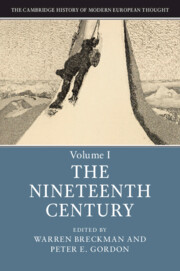Book contents
- The Cambridge History of Modern European Thought
- The Cambridge History of Modern European Thought
- The Cambridge History of Modern European Thought
- Copyright page
- Contents
- Contributors
- Preface
- Introduction
- 1 German Idealism: The Thought of Modernity
- 2 European Romanticism: Ambivalent Responses to the Sense of a New Epoch
- 3 History, Tradition, and Skepticism: The Patterns of Nineteenth-Century Theology
- 4 The Young Hegelians: Philosophy as Critical Praxis
- 5 Utilitarianism, God, and Moral Obligation from Locke to Sidgwick
- 6 Capital, Class, and Empire: Nineteenth-Century Political Economy and Its Imaginary
- 7 Positivism in European Intellectual, Political, and Religious Life
- 8 European Liberalism in the Nineteenth Century
- 9 European Socialism from the 1790s to the 1890s
- 10 Conservatism: The Utility of History and the Case against Rationalist Radicalism
- 11 The Woman Question: Liberal and Socialist Critiques of the Status of Women
- 12 Darwinism and Social Darwinism
- 13 Historicism from Ranke to Nietzsche
- 14 Philology, Language, and the Constitution of Meaning and Human Communities
- 15 Decadence and the “Second Modernity”
- 16 Nihilism, Pessimism, and the Conditions of Modernity
- 17 Civilization, Culture, and Race: Anthropology in the Nineteenth Century
- 18 The Varieties of Nationalist Thought
- 19 Ideas of Empire: Civilization, Race, and Global Hierarchy
- 20 Rethinking Revolution: Radicalism at the End of the Long Nineteenth Century
- Index
11 - The Woman Question: Liberal and Socialist Critiques of the Status of Women
Published online by Cambridge University Press: 15 August 2019
- The Cambridge History of Modern European Thought
- The Cambridge History of Modern European Thought
- The Cambridge History of Modern European Thought
- Copyright page
- Contents
- Contributors
- Preface
- Introduction
- 1 German Idealism: The Thought of Modernity
- 2 European Romanticism: Ambivalent Responses to the Sense of a New Epoch
- 3 History, Tradition, and Skepticism: The Patterns of Nineteenth-Century Theology
- 4 The Young Hegelians: Philosophy as Critical Praxis
- 5 Utilitarianism, God, and Moral Obligation from Locke to Sidgwick
- 6 Capital, Class, and Empire: Nineteenth-Century Political Economy and Its Imaginary
- 7 Positivism in European Intellectual, Political, and Religious Life
- 8 European Liberalism in the Nineteenth Century
- 9 European Socialism from the 1790s to the 1890s
- 10 Conservatism: The Utility of History and the Case against Rationalist Radicalism
- 11 The Woman Question: Liberal and Socialist Critiques of the Status of Women
- 12 Darwinism and Social Darwinism
- 13 Historicism from Ranke to Nietzsche
- 14 Philology, Language, and the Constitution of Meaning and Human Communities
- 15 Decadence and the “Second Modernity”
- 16 Nihilism, Pessimism, and the Conditions of Modernity
- 17 Civilization, Culture, and Race: Anthropology in the Nineteenth Century
- 18 The Varieties of Nationalist Thought
- 19 Ideas of Empire: Civilization, Race, and Global Hierarchy
- 20 Rethinking Revolution: Radicalism at the End of the Long Nineteenth Century
- Index
Summary
Although the philosophical and political conviction that women and men are equal came to be called feminism only in the 1890s, it had begun to be publicly articulated and debated more than a century earlier. The “woman question” came to prominence in Europe during the revolutionary decades at the end of the eighteenth century, but it drew on two older strands of argument: the “querelle des femmes” dating to the Renaissance, and debates over the relationship between the individual and society that marked the Enlightenment. Reflecting the explosive intellectual climate of the era, feminism took shape as a wide-ranging, international critique of traditional gender roles and patriarchal social structures. The place and role of women in society was a central problematic for thinkers grappling with the profound changes resulting from the industrial and political revolutions that inaugurated the “long” nineteenth century and remained contested to its end.
- Type
- Chapter
- Information
- The Cambridge History of Modern European Thought , pp. 255 - 278Publisher: Cambridge University PressPrint publication year: 2019

